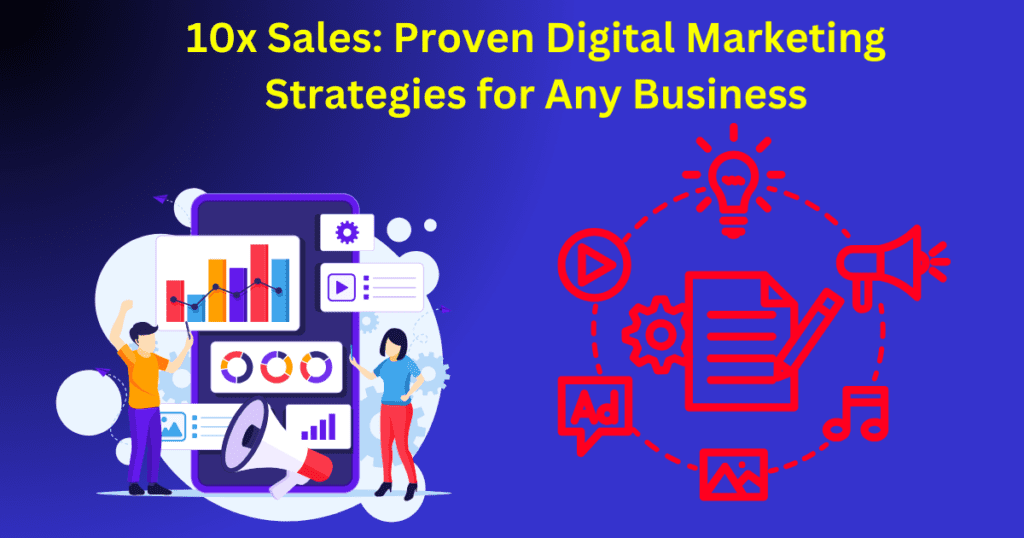10x Sales: Proven Digital Marketing Strategies for Any Business
4 Digital Marketing Strategies To Increase Sales Revenue For Any Business In 2024 In today’s digital world, everyone is glued to their screens, and that’s where your business needs to be as well. Digital marketing helps you enter your customers’ consideration set by overcoming the limitations of traditional advertising and reaching a massive online audience globally. So, leave the old-school tactics behind and discover four essential Digital Marketing Strategies that can multiply your business revenue tenfold. Increase Sales With 4 Powerful Digital Marketing Strategies Cracking the code of digital marketing begins with truly understanding how it works. The right strategy acts as your roadmap to success, helping you make smart decisions that drive real results, not just vanity metrics. Once you grasp the basics, implementing them becomes easier with the right tools, processes, and team, propelling your efforts to new heights. 1. Engaging Your Audience With Novel Content Your content should do more than sell—it should address the needs and interests of your target audience. Focus on offering actionable tips and solutions to their biggest challenges. Content marketing requires consistent effort, like a marathon, not a sprint. Novel content enhances traditional formats like blog posts, articles, eBooks, and videos. Polls, quizzes, and contests are excellent tools for sparking engagement. Keep your content relevant to your business and let the conversation flow! Blogs : Research what your target audience is searching for, including trending hashtags. Write insightful blog posts that contribute to those conversations. Infographics: Visual content is highly effective in grabbing attention. Infographics help boost website engagement and encourage visitors to take action (CTAs). Guides & eBooks: Use these as lead magnets to provide value to your audience. Include CTAs throughout to encourage conversions. 2 . Advertisements on Social Media Social media isn’t just for entertainment anymore—it’s where your potential customers hang out, chat, and discover new businesses. Combining paid ads with organic content like blogs, videos, and posts helps create a well-rounded marketing strategy. Tailor your branding to suit each platform’s vibe. For instance, while TikTok requires a playful tone, LinkedIn demands a more professional approach. LinkedIn: Ideal for B2B marketing. Create professional ads targeting specific industries or job titles. Facebook: With its vast user base, Facebook offers broad reach. Tailor your ads to different demographics and interests. Instagram: A visual platform, perfect for sharing eye-catching images and videos. Focus on promoting a lifestyle that complements your brand. Twitter: Keep your content concise and engaging. Use relevant hashtags to join trending conversations. 3 . Video Marketing Video marketing is booming, and it’s expected to grow even more. Live and branded videos are excellent for engaging viewers, and live sessions offer a personal touch. You don’t need a huge budget—your smartphone and free editing apps can do the trick. To stand out, optimize your videos with relevant keywords and catchy titles. There’s a flood of video content online, so make sure yours is unique and appealing. Embrace Video: Create fun, unexpected videos showcasing your product in creative ways. Bold Claims, Solid Proof: Make daring claims about your brand and back them up with facts. Newsworthy Launch: Generate buzz by hosting a virtual press conference for your latest product. Give Back: Support a cause outside your industry, which can help build brand credibility. 4. Optimization of Google My Business (GMB) Page Google My Business (GMB) allows you to control your online presence by updating your profile with offers, photos, and reviews. It acts as a digital storefront, available 24/7, and best of all, it’s free. GMB optimization offers several benefits: Take Control of Your Online Presence: Manage and showcase essential business information across Google Search and Maps. Connect with Potential Customers: Engage directly with interested customers, building trust and answering their queries. Build Your Online Reputation: Actively manage reviews to turn happy customers into brand advocates. Leverage User-Generated Content: Showcase customer photos, videos, and testimonials to boost credibility. Gain Customer Insights: Access valuable data on how customers find you, allowing for more targeted marketing strategies.


